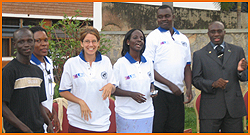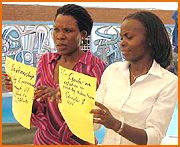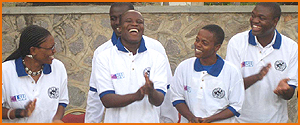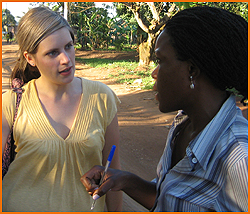Tackling Poverty
TACKLING POVERTY TOGETHER
The Role of Young People in Poverty Reduction
Background
 In June 2005, the UN Department of Economic and Social Affairs (DESA) initiated a project called “Tackling Poverty Together: The Role of Young People in Poverty Reduction Strategies”. The primary motivation for the project was the recognition that although large numbers of young people are adversely affected by poverty, youth are seldom identified as a target group requiring specific support, interventions, and budget outlays in Poverty Reduction Strategy Papers (PRSPs). Over time, the project has created a network of collaboration between youth organizations in eight countries, namely Ghana, Kenya, Liberia, Malawi, Sweden, Tanzania, Uganda and Zambia.
In June 2005, the UN Department of Economic and Social Affairs (DESA) initiated a project called “Tackling Poverty Together: The Role of Young People in Poverty Reduction Strategies”. The primary motivation for the project was the recognition that although large numbers of young people are adversely affected by poverty, youth are seldom identified as a target group requiring specific support, interventions, and budget outlays in Poverty Reduction Strategy Papers (PRSPs). Over time, the project has created a network of collaboration between youth organizations in eight countries, namely Ghana, Kenya, Liberia, Malawi, Sweden, Tanzania, Uganda and Zambia.
 Through workshops and communication across distance, the project has established youth-led “Tackling Poverty Together” or “TPT” country teams in each of these countries. This has generated an inspiring amount of cooperation between youth organizations both within and between countries. It has enabled the exchange of information and ideas to strengthen the ability of youth organizations to engage in discussions and programmes related to combating poverty.
Through workshops and communication across distance, the project has established youth-led “Tackling Poverty Together” or “TPT” country teams in each of these countries. This has generated an inspiring amount of cooperation between youth organizations both within and between countries. It has enabled the exchange of information and ideas to strengthen the ability of youth organizations to engage in discussions and programmes related to combating poverty.
Who’s who in the TPT project?
 The Technical Cooperation Unit of the Division for Social Policy and Development at DESA coordinates the Tackling Poverty Together project. In each of the TPT countries, a collective of youth organizations work together to guide and implement the project, while one organization acts as a focal point. This arrangement serves to preserve and expand the spirit of collaboration and joint ownership of the TPT project by several stakeholders. Below are some of the TPT project partners:
The Technical Cooperation Unit of the Division for Social Policy and Development at DESA coordinates the Tackling Poverty Together project. In each of the TPT countries, a collective of youth organizations work together to guide and implement the project, while one organization acts as a focal point. This arrangement serves to preserve and expand the spirit of collaboration and joint ownership of the TPT project by several stakeholders. Below are some of the TPT project partners:
In Ghana: Youth Empowerment Synergy (YES-Ghana); Global Youth Action Network – Ghana, the Federation of Youth Associations of Ghana (FEDYAG).
In Kenya: The National Council of Youth for Habitat, Kenya Disabled Action Network (KEDAN), Youth Alive Kenya, Kibera Community Youth Programme, Youth Agenda Kenya, Youth Initiative Kenya (YIKE) and G.R.A.C.E. Africa.
In Liberia: Veteran’s Child Soldier Association of Liberia, Federation of Liberian Youth (FYL), Christian Children’s Fund, Mano River Youth Parliament, Liberian Youth and Adolescent Network, AIESEC, and the Children’s Assistance Program.
In Malawi: The Centre for Community Empowerment and Development (CECAD), the Catholic Commission for Justice and Peace (CCJP), YouthNet and Counseling – YONECO, FOCUS - Foundation for Community Support Services, the Malawi Girl Guide Association, the Scout Association of Malawi, Young Advocates for the Advancement of ICT-related Development, Mzuzu Youth Association, and the Centre for Children and Youth Affairs. The National Youth Council of Malawi supports the TPT team in an advisory capacity.
In Sweden: The National Council of Swedish Youth Organizations (LSU), Save the Children Youth – Sweden (RBUF), Red Cross Youth Association (RKUF), the Mission Covenant Youth of Sweden (SMU), the Church of Sweden Youth, Peacequest, YWCA – YMCA of Sweden (KFUK-KFUM), CISV Sweden, Centre Party Youth Sweden (CUF), Booster, Nordic Youth Forum (FNUF), the Swedish Federation of Young Scientists, Young Muslims Sweden (SUM), The Swedish Association of International Affairs (SAIA) and Social Democratic Youth Sweden (SSU).
In Tanzania: The Youth of United Nations Association (YUNA), the Tanzania Youth Vision Association (TYVA), Tanzania Youth Coalition (TYC), and the Mikunguni Youth Development Organization (MYDO) in Zanzibar.
In Uganda: The National Association of Youth Organizations in Uganda (NAYOU), the Uganda Girl Guide Association, and the Lyantonde Youth Development Association.
In Zambia: the National Youth Development Council, the Copperbelt Province Youth Forum, and the National Youth Constitutional Assembly (NYCA).
 Another key stakeholder in the TPT project is the National Council of Swedish Youth Organizations (LSU). In addition to coordinating a TPT team in Sweden, LSU helps the project strengthen youth-led organizations by linking it to the Global Advocacy Local Empowerment (GALE) programme. GALE activities aim to make young people aware of the international commitments that secure their rights and responsibilities and to advocate for increased youth participation in decision-making. LSU’s role in the TPT project also underscores the importance of building greater understanding, solidarity, and cooperation between youth organizations in developed and developing countries.
Another key stakeholder in the TPT project is the National Council of Swedish Youth Organizations (LSU). In addition to coordinating a TPT team in Sweden, LSU helps the project strengthen youth-led organizations by linking it to the Global Advocacy Local Empowerment (GALE) programme. GALE activities aim to make young people aware of the international commitments that secure their rights and responsibilities and to advocate for increased youth participation in decision-making. LSU’s role in the TPT project also underscores the importance of building greater understanding, solidarity, and cooperation between youth organizations in developed and developing countries.
 The TPT project works in cooperation with the UN Population Fund (UNFPA), a partner in developing and delivering the “Youth & PRSP” e-course. UNFPA emphasizes the need to incorporate the rights and multi-sector needs of young people in poverty reduction strategies. UNFPA’s work is guided by a Framework for Action on Adolescents and Youth that contains four keys for UNFPA-supported adolescent and youth programmes: creating a supportive policy environment; facilitating gender-sensitive, life skills-based sexual and reproductive health (SRH) education; promoting a core package of SRH services; and fostering young people's leadership and participation.
The TPT project works in cooperation with the UN Population Fund (UNFPA), a partner in developing and delivering the “Youth & PRSP” e-course. UNFPA emphasizes the need to incorporate the rights and multi-sector needs of young people in poverty reduction strategies. UNFPA’s work is guided by a Framework for Action on Adolescents and Youth that contains four keys for UNFPA-supported adolescent and youth programmes: creating a supportive policy environment; facilitating gender-sensitive, life skills-based sexual and reproductive health (SRH) education; promoting a core package of SRH services; and fostering young people's leadership and participation.
The Tackling Poverty Together project is supported financially by the Swedish International Development Cooperation Agency (Sida).
What is the TPT project’s overall goal and objectives?
The overall goal of the TPT project is to work directly with young people and their organizations to identify and strengthen their role in poverty reduction strategies. In particular, the next steps of the TPT project aim to:
- Support the expansion of the TPT country team peer networks;
- Further build the capacity and skills available within the TPT country teams to engage in processes related to PRSPs;
- Increase the level of in-country support available to the TPT country teams to work on poverty reduction strategies;
- Create opportunities to apply the knowledge and skills gained through the project to advancing youth involvement in poverty reduction strategies
- Increase the linkages between the TPT project and other policy efforts in support of effective youth development.
The Youth & PRSPs E- Learning Course
 The Youth & PRSPs E-Learning Course responds to some of the lessons learned to date with the TPT project. First, the processes involved in developing economic growth and poverty reduction strategies are complex. They can involve assessing macro economic trends and social priorities, gathering and analyzing data and information, prioritizing and costing different program alternatives, preparing and tracking budgets, and monitoring impacts and outcomes. While the TPT project has previously held short workshops related to these topics, many of these topics are best understood over time and through continued interaction with and support from others. This is why the e-course involves mentors.
The Youth & PRSPs E-Learning Course responds to some of the lessons learned to date with the TPT project. First, the processes involved in developing economic growth and poverty reduction strategies are complex. They can involve assessing macro economic trends and social priorities, gathering and analyzing data and information, prioritizing and costing different program alternatives, preparing and tracking budgets, and monitoring impacts and outcomes. While the TPT project has previously held short workshops related to these topics, many of these topics are best understood over time and through continued interaction with and support from others. This is why the e-course involves mentors.
Second, even with an increased ability to discuss, analyze and improve PRSPs, youth organizations cannot influence and affect poverty reduction policies on their own. They require support, particularly at the national and local levels, to strengthen and advance their ideas for poverty reduction. They need strong peer networks, on-the-ground mentorship, and the assistance of their governments and development partners. While building collaborative relationships is a challenging task, it is a practical means for expanding the project’s impact and sustainability.
 Third, it is not enough to build capacity without creating opportunities to practically apply and test the newfound understanding. Therefore this e-course is designed to require participants to work together to develop an outcome activity that applies the knowledge and tools gained throughout the course.
Third, it is not enough to build capacity without creating opportunities to practically apply and test the newfound understanding. Therefore this e-course is designed to require participants to work together to develop an outcome activity that applies the knowledge and tools gained throughout the course.
Overall, the Youth & PRSPs E-Learning Course is much more than a learning exercise. It is a major component of the TPT project that aims to tangibly increase the support and tools available to youth organizations to engage in poverty reduction policies.
For more information in the TPT project, please send a message to youth@un.org with “TPT project” in the subject line.
Photocredits: Julie Larsen
 Welcome to the United Nations
Welcome to the United Nations